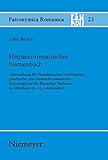Hispano-romanisches Namenbuch : Untersuchung der Personennamen vorrömischer, griechischer und lateinisch-romanischer Etymologie auf der Iberischen Halbinsel im Mittelalter (6.-12. Jahrhundert) / Lidia Becker.
Material type: TextSeries: Patronymica Romanica : Actes - Monographies - Sources onomastiques ; 23Publisher: Tübingen : Max Niemeyer Verlag, [2009]Copyright date: ©2009Description: 1 online resource (1166 p.)Content type:
TextSeries: Patronymica Romanica : Actes - Monographies - Sources onomastiques ; 23Publisher: Tübingen : Max Niemeyer Verlag, [2009]Copyright date: ©2009Description: 1 online resource (1166 p.)Content type: - 9783484555235
- 9783484971264
- 400
- online - DeGruyter
- Issued also in print.
| Item type | Current library | Call number | URL | Status | Notes | Barcode | |
|---|---|---|---|---|---|---|---|
 eBook
eBook
|
Biblioteca "Angelicum" Pont. Univ. S.Tommaso d'Aquino Nuvola online | online - DeGruyter (Browse shelf(Opens below)) | Online access | Not for loan (Accesso limitato) | Accesso per gli utenti autorizzati / Access for authorized users | (dgr)9783484971264 |
Browsing Biblioteca "Angelicum" Pont. Univ. S.Tommaso d'Aquino shelves, Shelving location: Nuvola online Close shelf browser (Hides shelf browser)
Diss. Universität Trier 2007.
Frontmatter -- Inhaltsverzeichnis -- Einleitung -- A -- B -- C -- D -- E -- F -- G -- H -- I -- K -- L -- M -- N -- O -- P -- Q -- R -- S -- T -- U -- V -- Z -- Backmatter
restricted access online access with authorization star
http://purl.org/coar/access_right/c_16ec
Das Hispano-romanische Namenbuch stellt ein Lexikon der Personennamen vorrömischer, griechischer und lateinisch-romanischer Herkunft auf der Iberischen Halbinsel im 6.-12. Jh. dar. In der Einleitung wird eine Übersicht über die mittelalterliche Personennamengebung (diatopische, diastratische und sozialhistorische Aspekte) sowie die sprachliche Struktur (Etymologie, Semantik, Morphologie, Wortbildung) angeboten. Die ca. 1100 Namenbuchartikel enthalten neben kultur- und sprachgeschichtlichen Kommentaren repräsentative Beleglisten aus Editionen mittelalterlicher Urkunden. Die Kommentare behandeln die Etymologie, Benennungsmotivation, kultur- und sozialgeschichtliche Fragestellungen (z. B. Einfluss von Heiligenkulten oder von Herrschern), die Statistik, die sprachliche Struktur (von besonderem Interesse sind delexikalische Namen sowie Aspekte des Sprachkontakts am Beispiel hybrider Bildungen), diastratische Aspekte (z. B. Namen von Juden und Mozarabern, Unterschiede zwischen Geschlechtern und Gesellschaftsschichten), die Verbreitung in romanischen Ländern und die Weiterentwicklung in den heutigen romanischen Sprachen. Zum Schluss wird auf die entsprechende Sekundärliteratur verwiesen.
The Hispano-Romance Dictionary of Names presents a dictionary of personal names with pre-Roman, Greek and Latin-Romance etymology on the Iberian Peninsula in the Middle Ages (6th - 12th centuries). The introduction provides an overview of medieval personal nomenclature (diatopic, diastratic, and socio-historical aspects) and of linguistic structures (etymology, semantics, morphology, word-formation). There are some 1100 entries in the dictionary; besides commentaries on cultural and linguistic history, they contain representative lists of instances of the names from editions of medieval documents. The commentaries deal with etymology, the motives behind names, questions of social and cultural history (e.g. influence of saints’ cults or of rulers), linguistic structure (of particular interest are delexical names and aspects of language contact as evidenced by hybrid formations), diastratic aspects (e.g. names of Jews and Mozarabs, differences between genders and social strata), the spread of the names in Romance countries, further developments in present-day Romance languages, and finally, references to the relevant secondary literature.
Issued also in print.
Mode of access: Internet via World Wide Web.
In German.
Description based on online resource; title from PDF title page (publisher's Web site, viewed 28. Feb 2023)









